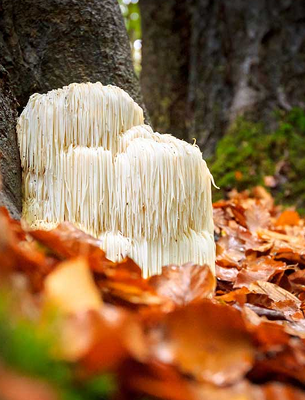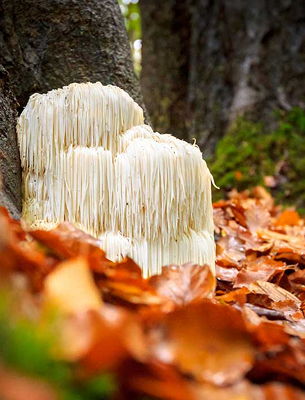 Lions Mane Mushroom 40% Extract, USDA Organic
Lions Mane Mushroom 40% Extract, USDA Organic
Lion's Mane is highly regarded for its potential health benefits. Lion's Mane mushrooms have a long history of use in traditional Chinese medicine, where they are believed to support overall well-being and have a range of medicinal properties. Lion's Mane has gained recognition in the western wellness world due to its potential cognitive and neurological benefits. It is often used as a nootropic, a substance believed to enhance cognitive function, memory, and focus. Some studies suggest that Lion's Mane may have neuroprotective properties and could potentially support brain health and promote nerve regeneration. Lion's Mane mushrooms are a good source of nutrients and bioactive compounds. They contain various vitamins, minerals, and antioxidants, which may contribute to their potential health benefits.
TMW® Lions Mane extract is the highest concentration on the market of beta-glucans 1,3 and 1,6. See beta-glucan benefits below.
Benefits:
Cognitive Function: Lion's Mane is often used as a nootropic due to its potential effects on cognitive function. Some research suggests that Lion's Mane may enhance memory, focus, and overall cognitive performance. It is believed to support brain health by promoting the production of nerve growth factors that are essential for nerve cell growth and function.
Neuroprotection: Lion's Mane mushrooms contain bioactive compounds that may have neuroprotective effects. They have been studied for their potential to reduce inflammation and oxidative stress in the brain, which are associated with neurodegenerative diseases such as Alzheimer's and Parkinson's. Lion's Mane may also support nerve regeneration and myelination, the process of forming a protective sheath around nerves.
Antioxidant: Lion's mane contains compounds that can neutralize and scavenge harmful free radicals in the body; help protect cells from oxidative damage; antioxidant effects might help protect brain cells from oxidative stress.
Anti-inflammatory: Some studies suggest lion's mane may help lower levels of pro-inflammatory compounds in the body; Its anti-inflammatory properties might benefit those with inflammatory bowel conditions; by lowering inflammation, it may help alleviate certain types of pain.
Mood and Mental Health: Some preliminary studies suggest that Lion's Mane may have positive effects on mood and mental health. It has been reported to potentially reduce symptoms of anxiety and depression in animal studies. However, more research is needed to understand the mechanisms behind these effects and their applicability to humans.
Digestive Health: Traditional use of Lion's Mane in herbal medicine includes its potential benefits for the digestive system. It may help support a healthy gut microbiota by promoting the growth of beneficial bacteria and inhibiting the growth of harmful microbes. Additionally, Lion's Mane may have anti-inflammatory properties that could be beneficial for gastrointestinal health.
Immune System Support: Lion's Mane mushrooms contain polysaccharides and other compounds that may support immune function. Some research suggests that they may enhance the activity of certain immune cells and increase the production of immune-modulating substances. This could potentially contribute to a stronger immune response and improved overall immune health.
Lions Mane Mushroom effects on the 12 Hallmarks of Aging:
Telomere Attrition:
Lion's Mane mushrooms may indirectly support telomere health and slow down telomere shortening by reducing oxidative stress and chronic inflammation with their antioxidant and anti-inflammatory properties.
Epigenetic Alterations:
Lion's Mane mushrooms' antioxidant and anti-inflammatory properties can create a favorable epigenetic environment by reducing oxidative stress and inflammation, which can impact gene expression through epigenetic modifications.
Cellular Senescence:
Lion's Mane mushrooms' bioactive compounds may reduce oxidative stress and inflammation, potentially contributing to a reduction in cellular senescence. Additionally, Lion's Mane stimulates the production of Nerve Growth Factor (NGF), promoting nerve cell development, maintenance, and regeneration.
Inflammation:
Lion's Mane mushrooms reduce inflammation by lowering inflammatory markers and inhibiting specific inflammatory pathways, such as NF-κB activation. Bioactive compounds, including polysaccharides and triterpenes, abundant in Lions Mane, have been found to inhibit specific inflammatory pathways.
Genomic Instability:
Lion's Mane mushrooms' antioxidant and anti-inflammatory properties can indirectly support genomic stability by reducing oxidative stress and mitigating inflammation-induced DNA damage, which can contribute to genomic instability.
Mitochondrial Dysfunction:
Lion's Mane mushrooms may enhance cellular energy production by promoting mitochondrial biogenesis and protecting mitochondria from oxidative damage through their antioxidant activity.
Stem Cell Exhaustion:
Lion's Mane mushrooms have shown promise in promoting neurogenesis, the process of generating new neurons from neural stem cells, which could indirectly impact nerve growth and brain health.
Loss of Proteostasis:
Lion's Mane mushrooms may help maintain proteostasis by reducing oxidative stress and inflammation, which can disrupt proteostasis and contribute to protein misfolding and aggregation.
Deregulated Nutrient Sensing (metabolic disorders):
Lion's Mane extract improves glucose metabolism, reducing blood sugar levels and enhancing insulin sensitivity, and may also influence lipid metabolism by lowering total cholesterol and triglyceride levels, benefiting individuals with metabolic disorders.
Altered Intercellular communication:
Lion's Mane mushrooms support enhanced cellular communication in the nervous system by stimulating Nerve Growth Factor (NGF) production, promoting neurite outgrowth, and modulating neurotransmitter levels.
Microbiome Dysbiosis:
Lion's Mane mushrooms can modulate gut microbiota composition, promoting the growth of beneficial bacteria and reducing harmful ones. This is partly due to its prebiotic effects, providing nourishment for beneficial gut microbes and creating a favorable microbial environment.
Sources:
Chemistry, Nutrition, and Health-Promoting Properties of Hericium erinaceus (Lion's Mane) Mushroom Fruiting Bodies and Mycelia and Their Bioactive Compounds (Accessed through Kara’s USC account):
https://pubs.acs.org/doi/10.1021/acs.jafc.5b02914
Therapeutic Potential of Hericium erinaceus for Depressive Disorder:
https://www.ncbi.nlm.nih.gov/pmc/articles/PMC6982118/
Lion’s Mane (also known as Hericium erinaceus): (Alzheimers Drug Discovery Foundation):
https://www.alzdiscovery.org/uploads/cognitive_vitality_media/Lion's-Mane-UPDATE.pdf
Neurotrophic properties of the Lion's mane medicinal mushroom, Hericium erinaceus (Higher Basidiomycetes) from Malaysia:
https://pubmed.ncbi.nlm.nih.gov/24266378/
Antihyperglycemic and antihyperlipidemic activities of aqueous extract of Hericium erinaceus in experimental diabetic rats:
https://www.ncbi.nlm.nih.gov/pmc/articles/PMC3852124/
Searching for a Longevity Food, We Bump into Hericium erinaceus Primordium Rich in Ergothioneine: The “Longevity Vitamin” Improves Locomotor Performances during Aging:
